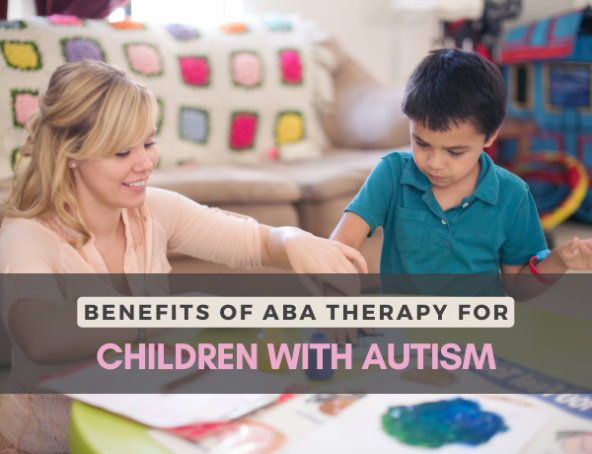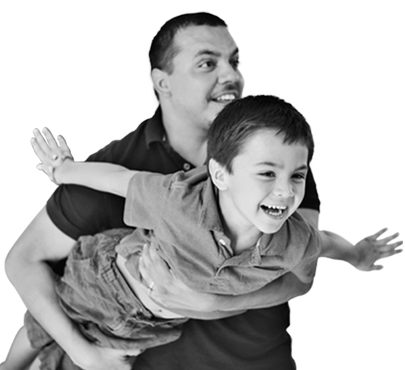Benefits of ABA Therapy for Children with Autism

ABA Therapy: Empowering Children on the Autism Spectrum with Evidence-Based Treatment
Autism spectrum disorder (ASD) is a complex neurodevelopmental disorder reported by the CDC to affect approximately one in 54 children in the US (according to 2016 data). While there is an extensive range of abilities and diversity of people on the autism spectrum, it is often characterized by the following:
- Difficulties in social communication differences, including verbal and nonverbal communication
- Deficits in social interactions
- Restricted, repetitive patterns of behavior, interests, or activities, and sensory problems
Various treatments and therapies, including speech and occupational therapy and assistive technology, are often used to improve the skills of people on the autism spectrum. One of the most widely used treatments is Applied Behavior Analysis (ABA). ABA is considered the gold standard in autism treatment by the US Surgeon General and the American Psychological Association because it has been studied for decades and has the largest body of scientific research to support its effectiveness. That is why ABA therapy is often referred to as the most “evidence-based” treatment available for autism.
What is ABA?
Applied Behavior Analysis (ABA) is the application of the science of behavior used to improve lives through behavior change. The science of behavior focuses on how people learn and why they do (or don’t do) certain things. By understanding why behavior occurs, we can figure out how to help people make positive changes in their lives. ABA is built on a large body of research that describes how behaviors can be learned or changed over time.
Many individuals on the autism spectrum need support with learning specific skills or new behaviors that are positive and functional, to replace challenging behaviors such as tantrums or aggression. ABA Therapy can be very effective with teaching skills in these common areas:
- Social interaction
- Play skills
- Functional communication
- Leisure activities
- Self-help and adaptive skills
- Gross & fine motor play
- Daily living activities
How ABA Works
When ABA is used to help children on the autism spectrum, the goal is to teach them new skills that will make a significant, positive impact on their development. ABA can also help children reduce behaviors that interfere with living a valued, meaningful life.
ABA treatment focuses on identifying why a person engages in a particular behavior and then seeks to create environments that support effective, lasting change for the better. When new, helpful behaviors bring about good results, old, unhelpful behaviors begin to decrease.
Applied Behavior Analysis helps explain:
- Why certain behaviors do or do not occur
- How behavior is affected by the environment
- How to create a treatment plan that supports lasting change
ABA Therapy Models
There are multiple ABA Therapy treatment models. The specific model selected may depend on your child’s age, challenges, and other factors.
- Early intensive behavioral intervention (EIBI), also known as Comprehensive ABA, is often recommended for children younger than five years of age. It involves an intensive, individualized curriculum that teaches communication, social interaction, and functional and adaptive skills. EIBI programs are typically intensive (up to 40 hours of treatment per week) and target communication, social, and adaptive skills.
- Focused ABA is typically recommended for school-aged children. It is less intensive (up to 20 hours per week) and targets one or two skill areas. Typically, the focus at this age is on improving communication skills and teaching adaptive skills for greater independence.
- Consultative ABA provides support to caregivers as opposed to providing direct services to the child. It’s usually short-term and designed to provide direction to caregivers as they transition from more intensive service models or navigate specific concerns. This model usually only focuses on one or two particular skills.
What to Expect with ABA Therapy
ABA Therapy can be delivered in the individual’s home, clinic setting, school, and the community. ABA programs include Board Certified Behavior Analysts (BCBAs), who are Masters-level professionals and direct care providers, who, in most cases, are Registered Behavior Technicians (RBTs), a national certification.
The role and responsibilities of the BCBA include:
- Conducting assessments
- Developing treatment goals
- Providing training to parents and caregivers
- Overseeing the work of direct care providers
- Monitoring the ongoing progress of the individual
Depending on the intensity of the treatment, BCBAs may work with the child and direct care providers as little as two to three times a month or several times per week.
The role and responsibilities of the direct care providers are to carry out the elements of the treatment plan. They receive regular ongoing training and supervision from a BCBA. In addition, direct care providers will spend time practicing the skills described in the treatment plan using the teaching strategies prescribed by the BCBA.
While a typical session will include play, practicing daily activities like toileting or dressing, and structured teaching activities, ABA is customized for each child’s strengths and needs. It’s designed to improve the quality of life for the child and their family.
Arizona Autism United (AZA United) uses a family-centered approach, listening to the family’s needs and working with parents and caregivers on essential concerns. The success of ABA relies on parents and caregivers to help implement the treatment procedures provided by the BCBA and RBTs.
The ultimate goal in parent training is to give parents the tools to approach problems with proven, successful strategies that they can use with confidence for years to come. To accomplish this, your BCBA will teach you about strategies that will help to reinforce the work they do in treatment.
Getting Started with ABA Therapy
The first step for parents and caregivers interested in learning about ABA and beginning treatment is to obtain a list of reputable providers in the area. It’s crucial to reach out to several agencies so that you have options. As you begin your search, there are several questions to consider when making your selection:
- When can you expect to begin services?
Depending on your child’s age and your family’s availability for services, you may have to wait for services to start.
- Where does your agency provide services?
Not all agencies provide school, home, or clinic-based services. Determine what will work best for your child and your family. Keep in mind that your BCBA may recommend different settings depending on the needs of your child.
- Is your agency in-network with my insurance provider?
Many agencies accept major private or Medicaid insurance plans but verify this before starting.
- How long has the agency been providing ABA treatment?
The treatment of autism has experienced enormous growth in the last several years, which has led to the creation of many new autism service agencies. While this increase helps improve access to services for many individuals, it can also mean that newer agencies lack an established agency’s experience, expertise, and longevity.
- Is the agency accredited by the Behavioral Health Center of Excellence® (BHCOE)?
The BHCOE is an international accrediting body created to meet accreditation needs specific to the delivery of behavior analysis. The BHCOE’s accreditation requirements and standards undergo regular review according to American National Standards Institute (ANSI) requirements for standard development.
An agency with this accreditation has undergone a thorough, independent review of its practices to ensure consumers receive ABA services from a quality organization.
ABA Treatment Steps
- Step 1: Assessments
Once you are ready to begin treatment, your BCBA will start by learning about your family and work with you to determine your child’s plan for treatment. The BCBA will ask about your child’s strengths and abilities as well as things that challenge them.
Assessment procedures usually take several sessions and will include a combination of activities. For example, the BCBA will spend time interacting with your child to observe their behavior, communication level, and skills. They may also visit your home and your child’s school to observe their behavior during typical daily activities.
Suppose your child is engaging in unsafe behaviors that interfere with their ability to participate in meaningful activities. In that case, the BCBA will conduct a special assessment called a Functional Behavior Assessment (FBA), designed to tell the BCBA the specific reasons these behaviors occur. Results from an FBA help the BCBA develop a tailor-made intervention designed to be highly effective.
Effective ASD treatment is tailored to each child. ABA therapists will mention specific interventions that fit your child’s needs. They may also ask about integrating particular strategies into your home life.
- Step 2: Developing a plan
Your child’s BCBA will use their observations from the assessments to create a formal treatment plan designed to align with your child’s unique needs that include concrete treatment goals.
The goals generally relate to teaching the child skills that are missing in their repertoire, specifically skills related to helping them replace other behaviors that prevent them from accomplishing their treatment goals. For example, all ABA programs include goals that target increasing or improving communication skills. The plan will also include specific strategies caregivers, teachers, and therapists can use to achieve treatment goals.
- Step 3: Frequent monitoring and evaluation
BCBAs will monitor your child’s progress throughout the treatment. Any necessary adjustments needed to modify the treatment will be based on the data you and your child’s direct care providers collect and their ongoing direct observations of your child’s progress.
All children are different, with unique personalities and needs, and no single therapy is guaranteed to help every child. However, research has repeatedly shown that ABA therapy can help many children on the autism spectrum thrive. Find out how AZA United’s extensive offering of programs and services can support you and your child.
Contact our Family Support Team if you would like to learn how to get started with ABA Therapy or any other programs and services that we offer. Our Family Support Team is always available to help and is available at no charge to all members of the autism and developmental disability community. Schedule a free phone appointment that works with your schedule by visiting azaunited.org/supportcall
You may also be interested in:
For more helpful resources and information, follow AZA United on social media:






